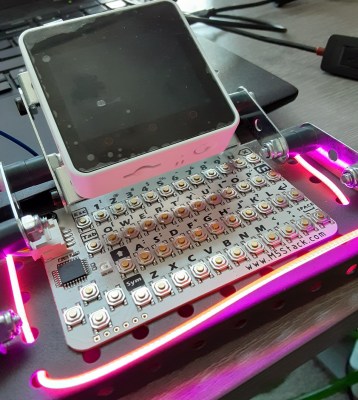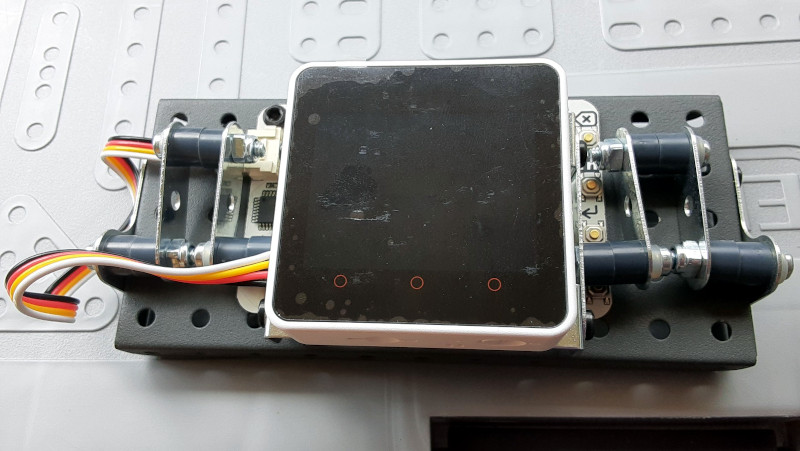While it would be a mistake to think there are any firm rules for what constitutes a cyberdeck, we can at least identify some common traits that would seem to give us a baseline description. For example, most deck builds we’ve seen have been fully-functional Linux computers, more often than not powered by some Raspberry Pi variant. But that doesn’t mean there isn’t room in the community for less computational powerful decks, or builds that are so bespoke that they can only perform a few selected tasks.
 As a perfect example, take a look at the RPG Character Tracker from [Melissa Matos]. You won’t find a Raspberry Pi here, nor a full operating system. Instead, we’ve got a M5Stack Core2 and an I2C CardKB Mini Keyboard wrapped up in a foldable frame made from Erector Set pieces. Add in a little LED lighting for that cyberpunk feel, and the stage is set.
As a perfect example, take a look at the RPG Character Tracker from [Melissa Matos]. You won’t find a Raspberry Pi here, nor a full operating system. Instead, we’ve got a M5Stack Core2 and an I2C CardKB Mini Keyboard wrapped up in a foldable frame made from Erector Set pieces. Add in a little LED lighting for that cyberpunk feel, and the stage is set.
So what does this diminutive build do? Well, apparently nothing right now. [Melissa] just got the hardware together and has only recently started aligning all the 1s and 0s to do her bidding. But what it’s supposed to do is clear enough: it’s intended to be an electronic companion to complex RPG tabletop games to help with things such as character creation. Sounds like it will also have a “roll dice” mode that will save you the trouble of having to crawl under the table when one of your D20s goes rogue.
While such a device could be useful for many different games, it should come as no surprise to hear that [Melissa] is currently targeting the cyberpunk Shadowrun.
Although we were particularly taken with the online tool that let you generate 3D printed organizers for all your tabletop gaming needs, we’d definitely rather have digital companions like this which would make those plastic baggies full of parts obsolete.

















This is a neat build with a nice aesthetic.
One thing we did in college was set up a Multi-User Dungeon for D&D, where players could explore the scenario/dungeon with a mix of text and spoken word, and the DM had private communication with individuals, so the DM could tell one character “the pretty maiden appears to be flirting with you” and another character “the thing you’re pretty sure is a shapeshifter is now trying to pick your friend’s pocket” and let the two of them argue it out from their perceptions, and get a very different playstyle. I think that something like this would be an interesting way of implementing that: way better than playing in the college terminal ward at 2 AM when nobody else was on the system.
Oooh neat idea, I’ve ended up doing something sort of similar but never really intentionally as a DM – the private messages used to share info only that PC should know, but never quite so integral to the story being created… Not sure the group I played with would work well with it, but still its a damn neat idea…
I know FantasyGrounds can already be used for such a purpose, I suspect many if not all the VTT could. As all the ones I know much about at least allow for direct messages to each player alone, and may only show the plain text if the player speaks that language.
Doing with this would be rather efficient and elegant for the entirely in person game, I do think however the DM’s version at least would need a full size keyboard or perhaps handwriting recognition pen input – as that is a great deal of typing on tiny awkward buttons.
Yeah, it really lent itself to in-party conflict, like, the paladin starts a quest to defeat the Evil and hires a bunch of people to help him, but they all have their own goals, like stealing the gold for themselves or getting into the place to get an artifact the paladin wants to destroy, and it’s really great when you can roll along an adventure that’s mostly about your players trying to manipulate each other. Having somewhat portable hardware to do that is way easier than what we were doing, which were basically LAN parties, and that didn’t give much flexibility to where we met.
Being able to track a character that has an RPG (rocket propelled grenade) seems like a valuable entry for the contest!
B^)
Looks super cool, just please peel off the screen sticker thing. Argh!
^ This, looks great but that screen protector hurts :P
Kind of yes, kind of no. It looks like the screen can tilt, but is always facing outward: if it were me, I’d leave that temporary protector in place until I had a case or some other way to protect the screen from scratches when not in use. That may be what [Melissa Matos] is doing.